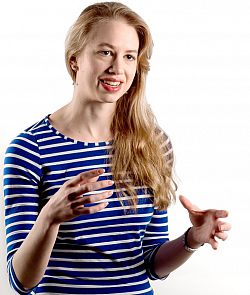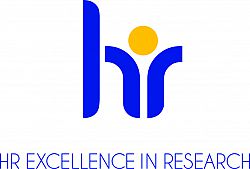| Message from the Research Staff Office |
|
Hello Everyone,
Welcome to this packed issue of the Sussex Researcher. March is the month in which we will be inviting you to tell us your views about being a Sussex researcher via the nationwide Careers in Research Online Survey (CROS) 2017. We will be contacting you shortly with information about how to participate in the Survey. We hope that as many of you as possible will contribute your views. CROS outcomes are used to directly inform how the University supports researchers - the higher the reponse rate, the more influence we can have to drive institutional changes that benefit you.
Need convincing? Check out what we have been able to achieve on the basis of your responses to CROS 2015 at the CROS webpage. Please help us to make the case for more improvements for Sussex researchers by ensuring you contribute to the survey when you receive the invitation in March.
Best wishes,
Natalie James (Research Staff Officer) and Kirsty Bridger (Researcher Development Coordinator)
|
| Introduction to the UK Higher Education Research Environment |
|
Wednesday 29th March: 13.30-15.30 - Book a place
Researchers in UK Higher Education Institutions (HEIs) are part of a complex research environment that involves Government, research funders, civil service/public sector organisations, other HEIs, policy makers, charities, business and the general public. Having an understanding of how university research fits within and is affected by the ever changing research environment is essential for all researchers that are looking to develop a sustainable and successful research career.
Participants will be introduced to key funding and policy issues affecting UK based researchers today and have an opportunity to discuss the implications for their own research activity.
Following this workshops participants will:
- Have an appreciation of how university research fits within the broader context of the UK research environment.
- Understand how UK research is funded and have an awareness of the key policy drivers affecting UK research activity.
- Have an awareness of the implications for UK based researchers of key issues including:
- Research Excellence Framework (REF)
- The Impact and Knowledge Exchange Agendas
- Open Research (and Innovation)
- Research Integrity and Governance
- Research careers and workforce development
- Collaboration, competition and concentration
- 'Brexit', Trump and other international developments
|
| Spotlight on...Dr Jillian Scudder |
|
 Research Fellow in at the Astronomy Centre in Extragalactic Astrophysics. Research Fellow in at the Astronomy Centre in Extragalactic Astrophysics.
I am working with galaxies that were formed in the very distant past, about 2-3 billion years after the Big Bang, when the universe was three to four times smaller than it is now.
I want to be able to understand the reasons why nearby galaxies are so different from galaxies that lived in the Universe's distant past. Nearby galaxies, including our own, tend to form only a few stars every year, but the distant ones are churning out hundreds to thousands of stars every year.
Distant galaxies also tend to have a large amount of dust, which blocks the visible light from the galaxy, making it hard for us to look at the galaxy's new stars directly. Instead, we can use the glow of the dust, heated by those stars, to figure out how many stars are hiding inside the galaxy's dust.
Read Jillian's Spotlight Profile here.
|
| News |
| Your feedback invited on 2017-21 plans for research staff support at Sussex |
|

In summer 2017, in order to retain its HR Excellence in Research Award , the University will be assessed by an external peer review panel on its activities and future plans to support the career development of research staff at Sussex.
To help ensure the plans appropriately address the needs of researchers, all Sussex research staff (and colleagues that support researchers) are invited to provide feedback on the draft report and draft 2017-2021 action plan (UoS login required) that set out the strategy and detailed actions for research staff support over the next four year period.
Any feedback on the draft plans should be sent to Natalie James N.A.James@sussex.ac.uk before Friday 3rd March (your comments will remain confidential).
Please take some time to look at the plans and provide any input you have as this is an important opportunity to influence how the University will support you and your colleagues into the future.
|
| Outcomes of your responses to 2016 appraisal/review survey |
|
Back in October 2016 you were invited to respond to a survey about your perceptions and experiences of appraisal/review processes at Sussex. We received a total of 90 responses, equating to a 25% response rate; thank you again to everyone that participated.
We can now bring you the full report and recommendations(UoS Login Required) arising from the 2016 research staff appraisal/review survey.
Key messages from the survey were:
- Interventions to enhance the appraisal process have resulted in significant improvements in both the participation in appraisal by research staff (69% improvement over 2013) and perceived usefulness of the process (119% improvement over 2013).
- The clarity of the research staff appraisal process has improved
- Further work is required to encourage follow up to the appraisal meeting to facilitate longer-term benefits.
- The research staff appraisal forms could be further refined to remove duplication
- A consideration of development of tailored documentation for research assistants is required.
Read the full report and recommendations here.
The recommendations are being implemented by the Research Staff Office and HR to continue to improve the appraisal/review processes for researchers.
|
| Call for Speakers - Be/com/ing Academic: A Doctoral Student/Early Career Researcher Symposium |
|
Are you an early career researcher who has ever felt that, regardless of your academic accomplishments, you are about to be unmasked as a fraud? That you'll never quite reach a stage of academic legitimacy?
Abtracts for contributions are invited for a one-day symposium aimed at exploring the emotional dimension of being and becoming academic. The symposium, on 24th May 2017, will involve presentations, workshops, creative activities and panel discussions.
This event intends to unpack different notions of what it means to both 'be' and 'become' academic, opening the space for innovative ideas around what an academic identity and academic engagement can encompass in today's world.
Early career researchers across disciplines are invited to submit proposals answering the following questions:
- What is your emotional experience of being / becoming an academic?
and/or
- How do these experiences influence the ways you work and the knowledge you produce?
All styles of delivery are welcome, from Pecha Kucha or Ted Talk-style presentations, spoken word/slam poetry, musical, dramatic or artistic interpretations.
To apply, please send a 250-word abstract or summary of your idea to becomingacademic2017@gmail.com by 5pm on the 1st of March 2017.
|
| New Teaching and Learning Toolkit on Study Direct |
|
 Sussex's new Teaching and Learning Toolkit has now been launched on Study Direct. Designed by teachers for teachers, the Toolkit offers tips, resources and support to people teaching at Sussex, whether you're teaching for the first time or an experienced HE teacher looking for ideas and advice. Sussex's new Teaching and Learning Toolkit has now been launched on Study Direct. Designed by teachers for teachers, the Toolkit offers tips, resources and support to people teaching at Sussex, whether you're teaching for the first time or an experienced HE teacher looking for ideas and advice.
The Toolkit is open to anyone teaching or planning to teach at Sussex, from PhD students through to senior members of staff. If it's not already appearing on your Study Direct homepage, you can subscribe here.
|
| Research Hive Seminar Series |
|
 This is the eighth year the successful series will invite researchers and those who support research into the Library to come and listen to speakers from Sussex and external experts, and to engage with colleagues from across campus. This is the eighth year the successful series will invite researchers and those who support research into the Library to come and listen to speakers from Sussex and external experts, and to engage with colleagues from across campus.
The full line-up for the series is:
- Thursday 9th March - Working with publishers to create a popular textbook
- Thursday 23rd March - Developing and disseminating research on social media
- Thursday 6th April - Planning for REF2021: How to plan and publish with REF in mind
Full details and booking information here.
|
| Study into Experience of Researchers Taking Maternity, Paternity, Adoption, and/or Parental Leave |
|

The UK Research Staff Association (UKRSA), in association with Vitae, is conducting a study investigating the experiences of researchers taking maternity, paternity, adoption, and/or parental leave.
Researchers who are or have previously been, a member of research staff, whether you are on a fixed-term or permanent contract, and whether you have or haven't taken the types of leave mentioned are invited you to take part in a survey. It will be administered via a secured site, and no personal information will be collected. Please read the information sheet before deciding whether to participate.
Please click here to take part in the survey.
The survey will be open until the 31st March 2017.
|
| Opportunities |
|
If applying for funding, remember to check funders' eligibility criteria carefully and discuss the opportunity with your host institution/department prior to preparing any applications.
|
| International Exchanges Scheme |
|
 The Royal Society invites applications for the standard programme of its international exchanges scheme. This stimulates new collaborations within the natural sciences between scientists in the UK and overseas. The scheme covers all areas of the life and physical sciences, including engineering but excluding clinical medicine. Collaborations should be based on a single project and travel should take place between UK and the country where the collaborator is based. The Royal Society invites applications for the standard programme of its international exchanges scheme. This stimulates new collaborations within the natural sciences between scientists in the UK and overseas. The scheme covers all areas of the life and physical sciences, including engineering but excluding clinical medicine. Collaborations should be based on a single project and travel should take place between UK and the country where the collaborator is based.
More information.
Application deadline: 7th March 2017
|
| Newton Advanced Fellowships |
|
 The Royal Society invites applications for the Newton advanced fellowships - Brazil, China, Malaysia, South Africa, Thailand and Turkey. These enable international researchers to establish and develop collaborations with the UK, with the intention of transferring knowledge and research capabilities. The skills and knowledge gained should contribute to advancing economic development and social welfare of the partner country. The Royal Society invites applications for the Newton advanced fellowships - Brazil, China, Malaysia, South Africa, Thailand and Turkey. These enable international researchers to establish and develop collaborations with the UK, with the intention of transferring knowledge and research capabilities. The skills and knowledge gained should contribute to advancing economic development and social welfare of the partner country.
More information.
Application deadline: 23rd March 2017
|
| Intelligence Community Postdoctoral Research Fellowships |
|
 The Royal Academy of Engineering and the Government Office for Science invite submissions for their intelligence community postdoctoral research fellowships. These support unclassified basic research in areas of interest to the intelligence, security and defence community. Members of the IC identify research topics and researchers work locally with university research advisors to develop and submit research proposals that align with relevant topics. The Royal Academy of Engineering and the Government Office for Science invite submissions for their intelligence community postdoctoral research fellowships. These support unclassified basic research in areas of interest to the intelligence, security and defence community. Members of the IC identify research topics and researchers work locally with university research advisors to develop and submit research proposals that align with relevant topics.
More information.
Application deadline: 10th April 2017
|
| Wellcome Trust Secondment Fellowships |
|
 The Wellcome Trust invites applications for its secondment fellowships. These support early-career humanities and social science researchers who are already funded by the trust. Researchers spend three to six months at one of the following organisations: Parliamentary Office of Science and Technology in London, Science Museum in London or the World Health Organisation in Copenhagen. The Wellcome Trust invites applications for its secondment fellowships. These support early-career humanities and social science researchers who are already funded by the trust. Researchers spend three to six months at one of the following organisations: Parliamentary Office of Science and Technology in London, Science Museum in London or the World Health Organisation in Copenhagen.
More information.
Application deadline: 19th April 2017
|
| Women in Humanities Postdoctoral Writing Fellowship |
|
The University of Oxford, under the Oxford Research Centre in the Humanities and the Women in Humanities programme, invites applications for its postdoctoral writing fellowship. This enables early-career scholars to explore how gender and sex play out in history, art, philosophy, music, language and literature, as well as the ethics and politics of gender identity and equality in the humanities.
More information.
Application deadline: 21st April 2017
|
| David Sainsbury Fellowships |
|
The National Centre for the Replacement, Refinement and Reduction of Animals in Research invites outlines for the David Sainsbury fellowships. These support early-career scientists with the transition to an independent career within one of the three areas of replacement, reduction and refinement and in any area of medical, biological or veterinary research. Proposals that integrate a range of disciplines, or that include an industrial partner, are particularly encouraged.
More information.
Application deadline: 24th April 2017
|
| BBSRC New Investigator Scheme |
|
 The Biotechnology and Biological Sciences Research Council invites applications for its new investigator scheme. This assists early-career researchers in securing their first major element of research funding. The Biotechnology and Biological Sciences Research Council invites applications for its new investigator scheme. This assists early-career researchers in securing their first major element of research funding.
More information.
Application deadline: 27th April 2017
|
| New Investigator Research Grants |
|
 The Medical Research Council invites proposals for its two new investigator research grants in population and systems medicine or neurosciences and mental health. This supports researchers who are capable of becoming independent principal investigators and who are ready to take the next step towards that goal within the area of neurosciences and mental health. The Medical Research Council invites proposals for its two new investigator research grants in population and systems medicine or neurosciences and mental health. This supports researchers who are capable of becoming independent principal investigators and who are ready to take the next step towards that goal within the area of neurosciences and mental health.
More information.
Application deadline for population and systems medicine grant: 24th May 2017
Application deadline for neurosciences and mental health grant: 31st May 2017
|
|

